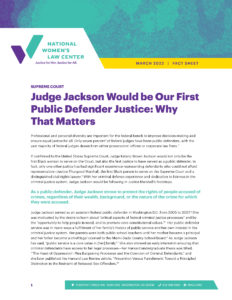
Professional and personal diversity are important for the federal bench to improve decision-making and ensure equal justice for all. Only seven percent1 of federal judges have been public defenders, with the vast majority of federal judges drawn from either prosecutors’ offices or corporate law firms.2
If confirmed to the United States Supreme Court, Judge Ketanji Brown Jackson would not only be the first Black woman to serve on the Court, but also the first Justice to have served as a public defender. In fact, only one other justice has had significant experience representing defendants who could not afford representation—Justice Thurgood Marshall, the first Black person to serve on the Supreme Court and a distinguished civil rights lawyer.3 With her criminal defense experience and dedication to fairness in the criminal justice system, Judge Jackson would be following in Justice Marshall’s footsteps.
As a public defender, Judge Jackson strove to protect the rights of people accused of crimes, regardless of their wealth, background, or the nature of the crime for which they were accused.
Judge Jackson served as an assistant federal public defender in Washington D.C. from 2005 to 2007.4 She was motivated by the desire to learn about “critical aspects of federal criminal justice processes” and by the “opportunity to help people in need, and to promote core constitutional values.”5 Her public defender service was in many ways a fulfillment of her family’s history of public service and her own interest in the criminal justice system. Her parents were both public school teachers until her mother became a principal and her father became a chief legal counsel to the Miami-Dade County School Board.6 As Judge Jackson has said, “public service is a core value in [her] family.”7 She also showed an early interest in ensuring that criminal defendants have access to fair legal processes—her Harvard undergraduate thesis was titled, “‘The Hand of Oppression’: Plea Bargaining Processes and the Coercion of Criminal Defendants,” and she later published the Harvard Law Review article, “Prevention Versus Punishment: Toward a Principled Distinction in the Restraint of Released Sex Offenders.”8
During her time as a public defender, Judge Jackson was determined to uphold the “principles that the government cannot deprive people…of their liberty without meeting its burden…, and that every person who is accused of criminal conduct by the government, regardless of wealth and despite the nature of the accusations, is entitled to the assistance of counsel.”9 She exemplified these principles in many of the cases she tried over the two and half years she was a public defender.
In United States v. Littlejohn,10 she successfully appealed the conviction of Andrew J. Littlejohn III, who had been convicted of unlawfully possessing a firearm. She appealed on the grounds that Littlejohn’s right to an impartial jury had been compromised when potential jurors were asked a compound question during the jury selection process. The potential jurors did not have to disclose if they had personal ties to law enforcement unless they believed they would be unable to be a fair and impartial juror.11 The D.C. Circuit panel agreed with Judge Jackson that this introduced a possible source of bias against Littlejohn, and the conviction was overturned.12
Judge Jackson similarly protected the rights of her defendant in an earlier D.C. Circuit case, United States v. Ponds.13 Navron Ponds was accused of fraud and tax evasion and, as part of his immunity agreement with prosecutors, turned over personal records to the government. The government later used these documents as part of their investigation into Ponds’ taxes, which Judge Jackson argued violated Ponds’ Fifth Amendment rights.14 The panel agreed with Judge Jackson, with Judge Judith Rogers writing, “The government cannot make an end-run around the Fifth Amendment by fishing for a document that will answer a question for which it could not demand an answer in oral examination.15
Judge Jackson’s time as a public defender has given her a unique and experienced perspective on the criminal justice system that informs her work as a judge.
Judge Jackson continued to spend a significant amount of time on public interest and criminal justice work even after she was no longer a public defender. In 2010, she served as the vice-chair of the U.S. Sentencing Commission and gained a reputation for consensus building.16 She supported the Commission’s decision to retroactively reduce penalties for crack cocaine—which disproportionately impacts the Black community17—making 12,000 people eligible for reduced sentences.18 Her dedication to public interest also continued during her time with general litigation firms, where she estimated she spent 15 to 20 percent of her time involved with pro bono litigation work or services.19 For example, she represented the American Bar Association in a case involving a parent’s right to counsel in child custody proceedings, even if that parent could not afford to pay for counsel.20
Her public defender background has also informed her experience as a judge, first on the U.S. District Court for the District of Columbia. and now on the U.S. Court of Appeals for the District of Columbia Circuit. As she has said, “[t]here is a direct line from my defender service to what I do on the bench, and I think it’s beneficial.”21 As a district court judge, she gave deep attention to the needs and perspectives of defendants. She would pore over letters from defendants’ relatives and made sure to take the time to ensure defendants understood why they were in her courtroom. As a former law clerk explained, Judge Jackson “really tries to understand the person’s role in the community and how they came to be before her. She would speak directly to them in a way I’m not sure all judges do.”22
Her record as a judge also reflects her experiences as a public defender. For example, in Make the Road New York v. McAleenan23 she issued a preliminary injunction to stop the Department of Homeland Security from increasing fast-track deportations under the Trump Administration. Fast-track deportations do not require immigration court hearings, and often occur so quickly that there is no time for individuals to consult a lawyer or collect evidence to prevent their deportation.24 In her opinion, Judge Jackson compared a sudden deportation with the sudden loss of a loved one, writing, “Ask anyone who is facing the potentially abrupt termination of a close, personal relationship with another person whether more time with that person makes a difference…there is no adequate legal remedy to make those who are forced to leave, or those who are left behind, completely whole[.]”25 In keeping with her dedication to ensuring access to fair legal processes for everyone, Judge Jackson found those facing fast-tracked deportations would suffer irreparable harm without a formal hearing process, and that the agency violated administrative law by not fully justifying the policy change or considering its impact.26
Conclusion
Judge Jackson’s history as a public defender makes her an especially strong candidate for the Supreme Court. If appointed, she would bring with her a deep understanding of the criminal justice system and the barriers low-income people face to access fair legal processes, something that is often lacking in federal courts in general and on the Supreme Court in particular. The Supreme Court would benefit immensely from the experience, expertise, and commitment to equal justice for all Judge Jackson gained during her time as a public defender.
1 Maggie Jo Buchanan, Pipelines to Power: Encouraging Professional Diversity on the Federal Appellate Bench, Ctr for Am. Progress (Aug. 13, 2020), https://www.americanprogress.org/issues/courts/reports/2020/08/13/489312/pipelines-power-encouraging-professional-diversity-federal-appellate-bench/.
2 Irin Carmon, The Other First: What it Means to Nominate a Veteran Public Defender, N. Y. Magazine (Feb. 25, 2022), https://nymag.com/intelligencer/2022/02/ketanji-brown-jacksons-public-defender-experience.html.
3 NAACP Legal Defense and Educational Fund, Thurgood Marshall, https://www.naacpldf.org/about-us/history/thurgood-marshall/ (accessed March 10, 2022).
4 Nudge Ketanji Brown Jackson, Response to Question for the Record from Senator Dick Durbin, Chair, Senate Judiciary Committee to Judge Ketanji Brown Jackson, Nominee to the United States Court of Appeals for the D.C. Circuit 6 (2020), https://www.judiciary.senate.gov/imo/media/doc/Brown%20Jackson%20Responses1.pdf.
5 Id. at 5.
6 Ann E. Marimow and Aaron C. Davis, Potential Pick Ketanji Brown Jackson Would Make History as First Federal Public Defender on Supreme Court, The Wash. Post (Feb. 11, 2022), https://www.washingtonpost.com/politics/2022/02/11/ketanji-brown-jackson-supreme-court-defender/.
7 Jackson, supra note 4, at 5.
8 Judge Ketanji Brown Jackson, United States Senate Committee on the Judiciary: Questionnaire for Nominee to the Supreme Court 5 (2022), https://www.judiciary.senate.gov/imo/media/doc/Jackson%20Public%20SJQ.pdf.
9 Jackson, supra note 4, at 5.
10 489 F.3d 1335 (D.C. Cir. 2007).
11 Id. at 1340-41.
12 Id. at 1337.
13 03-3135, 454 F.3d 313 (D.C. Cir. 2006).
14 Id. at 318; Jackson, supra note 8, at 141.
15 454 F.3d at 327.
16 Nina Totenberg, Ketanji Brown Jackson, A Supreme Court Prospect, Is Confirmed To A Key Appeals Court, NPR (June 14, 2021), https://www.npr.org/2021/03/30/977919229/ketanji-brown-jackson-bidens-pick-is-viewed-as-potential-supreme-court-justice.
17 Charlie Savage, Retroactive Reductions Sought in Crack Penalties, N.Y. Times (June 1, 2011), https://www.nytimes.com/2011/06/02/us/02cocaine.html.
18 Demand Justice, Judge Ketanji Brown Jackson, https://demandjustice.org/ketanji-brown-jackson/ (accessed March 10, 2022).
19 Jackson, supra note 8, at 148.
20 Id.
21 Kelsey Reichmann, Ketanji Brown Jackson’s Historic Nomination Puts Public Defender Experience on Center Stage, Courthouse News Service (Feb. 25, 2022), https://www.courthousenews.com/ketanji-brown-jacksons-historic-nomination-puts-public-defender-experience-on-center-stage/.
22 Marimow and Davis, supra note 6.
23 405 F. Supp. 3d 1 (D.D.C. 2019).
24 Beth Werlin, The Human Cost of Fast-Track Deportation, N.Y. Times (July 25, 2019), https://www.nytimes.com/2019/07/25/opinion/politics/expedited-deportation-trump-immigration.html.
25 405 F. Supp. 3d at 62.
26 Id. at 11-12.

